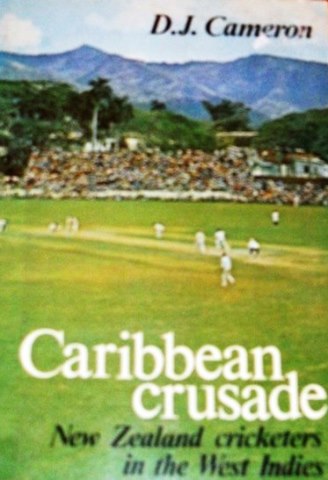Cameron’s Crusade
0On Wednesday New Zealand lost one of its best ever sports journalists and writers.
DJ Cameron was a sports writer from an age when writers, unburdened by online deadlines, could build a story, provide perspective with the benefit of hindsight, and use the subtleties of language to create a mental picture.
He said Cardus was his inspiration, and that came through in his writing.
Cameron covered cricket, rugby union and sailing for the NZ Herald for about 40 years. Yet he is probably best remembered for his cricket books; most notably Caribbean Crusade; the tale of the New Zealand cricket tour to the West Indies in 1972.
There has probably been no New Zealand sports writer so remembered for one piece of work.
That tour of the West Indies was like nothing New Zealand cricket team had ever faced before. As it has transpired, nothing has come remotely close to it since. It was an unchartered piece of New Zealand sporting adventure and it was chronicled by the best person for the job.
In the introduction to the book Murray Chapple, team manager, said: “The boys have fought like hell for 90 days, and yet if they had not survived those last 90 minutes they would have fought for nothing”.
Cameron then added his touch. “For 90 days the New Zealanders had battled through the heat and turmoil of what must be physically the hardest cricket tour in the world…
There were several times when they teetered on the brink of collapse and fewer times when they marched sure-footedly onward. Yet they did not fall; they did not fail and the mere fact that they reached the end of the tour unbeaten was more a triumph than the record books can ever indicate.
History has proved this to be so right. That tour was New Zealand’s first tour to the Caribbean, yet it was a five test series, over three months, comprising of 12 drawn matches.
It was an odyssey captured by Cameron, yet for most looking ack now it is more remembered for its rich legacy of statchat.
More Cameron: It was a triumph for the New Zealanders – victory over their own failings, over hard and often harsh conditions, over the excruciatingly bad luck of losing all five test tosses, over all the ingredients that make a tour of the West Indies a physical and mental ordeal. A triumph gained simply from that one priceless thing that will never find a place in Wisden’s records. Guts, spiti, morale, esprit-de-corps – call it what you will.
Esprit-de-corps. Such an underused term.
The first test, and Glenn Turner is carrying his bat to save a test. And he was on for a 200 too.
Three short.. Holford bowled, Turner swayed back and cut, Dowe chased like a demon but the ball beat him to the fence.
The Jamaicans thundered their praise.
A five test series has its own sub-plots. Lawrence Rowe, on debut, had a pretty handy debut test.
On the first day of the second test he dropped three catches and was booed off the field at the end of play. He never truly recovered from that.
There were few other pleasantries about the day and Rowe, with one catch in four attempts, was heartily booed as he came off the field”.
There was also the sub-plot of the toss. New Zealand, whether it be Dowling or Congdon, lost the lot of them. The trajectory of the series was best described in Cameron’s build-up to the final test.
That night was very much like the night before Waterloo without the revelry… In the psychological battle that the test series had become they had given the West Indies a fright in the second test, a sever shaking in the third and had ground the West Indies bowlers down in the fourth.
And New Zealand must surely, after four failures, win the most important toss of the series.
So, with Taylor looking as lively as a wrung-out dish-rag, the New Zealanders trudged out for the last battle – probably knowing even then that the odds were great against them winning it.
It was a truly remarkable three months. A marathon of punches and counter-punches. We were fortunate to have DJ Cameron there to chronicle it
